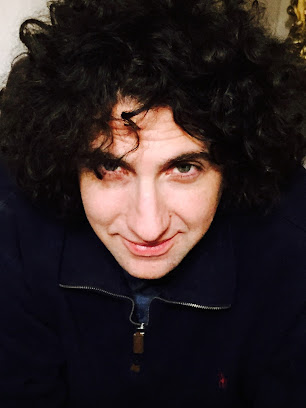mouthouthoughts, petro c.k.
LJMcD Communications, 2024
The term “avant-garde” today evokes a past dead canon of forward-looking pioneers. The term which originally was meant to cheer on precocious “new ideas…marching in the van of all intellectual faculties” per Henri de Saint-Simon, is now associated with a range of art movements decades or even a century past. The dream of an eternal avant-garde—artists forever out ahead of the social, political, and aesthetic trends—is, contradictorily, suffused with a backwards-looking nostalgia. After Duchamp put a urinal in a gallery, even pissing on art, no matter how daringly, starts to look like a footnote.
Petro c.k.’s mouthouthoughts (from LJMcD Communications, which has also published pamphlets from me) is very much one of those contradictory works in the avant-garde tradition of pissing on tradition. It doesn’t really feel contradictory, though, in part because Petro’s reverence and irreverence both are done with such open-heartedness. In mouthouthoughts, the avant-garde is not (just?) a fierce commitment to the new; it’s a community which can include past and present. “I am firmly convinced that all art will become dadistic in the course of time,” German dadaist Richard Huelsenbeck wrote, “because from Dada proceeds the perpetual urge for its renovation.”
That quote, along with other dada quips and semi-poems and profundities, appears in mouthouthoughts as inspiration, canvas and foil. As petro c.k. explains in a brief introduction, “Each poem starts off using a seminal quotation of the process and meaning of Dada from one of the heralded innovators, then using every available technique both old and new, it is cut up, repeated, rearranged, edited, and reconfigured.”
In practice what that means is that the book is a series of semi-syntactic units cast upon the page in a glorious gutter of garble and nonsense, deconstructing and reiterating dada’s seminal and revered anti-meaning. For example, Jean Arp’s koan “Dadaism has reduced positive and negative to utter nonsense. It has been destructive in order to achieve indifference,” is recast in part in the poem “Dachieder t hivevestive.” as
Daistes rucero po aincediveve.
Dadas nosmm Itive n nsm ne
ino aieruce torrrrrrrd
de neve.
Similarly, Tristan Tzara’s fierce/silly exhortation, “Every page should explode, either because of its staggering absurdity, the enthusiasm of its principles, or its typography,” is turned into a cascade of errant punctuation.
ts iagry , s oulde ’
ty.“e pr sm
ts, incaploriprincasm
tse aphexpriapageve. - , ,
, intapheveitsity.“e pleve
In each of these poems/things/train-wrecks, the programs of revered Dadaists past are enacted by vomiting and jumping up and down on the program, the reverence, the Dadaists, and the past. Arp’s demand that positive and negative be reduced to utter nonsense is literally reduced to utter nonsense. Tzara’s call for pages which explode with absurdity, enthusiasm, and typography is turned into absurdly exploding typography. The tradition of blasting tradition with a blunderbuss and scrambling about amidst the detritus is gleefully perpetuated despite itself, or to spite itself.
The Dadaists were full of glee and spite, but mouthouthoughts channels the first a lot more powerfully than the second. Dada, in its early twentieth century World War I European context, was animated by an aggressive disgust for bourgeois self-satisfaction and for the charnel house that bourgeois self-satisfaction had erected. “Dada hurts,” Huelsenbeck insisted. “Dada does not jest, for the reason that it was experienced by revolutionary men and not by philistines who demand that art be a decoration for the mendacity of their own emotions.”
Petro c.k.’s word splatter, in contrast, does feel like a jest, and doesn’t really seem like it’s trying to be revolutionary. If the Dadaists fired nonsense into the gaping maw of a sense they rejected and defied, Petro’s nonsense is a reiteration and extension of a previous rejection. It is not undoing language, but reclaiming a language already undone. And it’s not launched onto the page with a sneer, but with a giggling commendation.
So is mouthouthoughts truly avant-garde in the dada tradition? Or is it impossible for it to be avant-garde because it’s in the dada tradition? The answer, as petro c.k. might say, is “New ofrags/fradents/Ne be ous.”
Or, to put it less frabjously, you might say that the most avant-garde fragment of petro’s gibberish is the extent to which it is indifferent to the Romantic temptation of the avant-garde. The Dadaists programmatic, self-vaunting and self-immolating statements of world-historical contradictions (“the real dada’s are against Dada”) are turned into syntactic wallpaper. Vivisected bits of words and phrases lose their agonistic meaning and settle upon the landscape in a gentle patter. A fog does not have, or need, a cutting edge.
A fog does welcome everyone though, at least in the sense that all you have to do to be a part of it is immerse yourself. The avant-garde, as a race to the front, is that most bourgeoise of institutions, a competition. But the Dadaists were also avant-garde, arguably, because they foreswore the idea of genius in favor of a vision of art that involved a bunch of weirdos hanging out and farting nonsense around the urinal. Petro c.k.’s online journal, dadakuku (to which I’ve contributed) is very much in that spirit of gently opened veins from which little words are welcome to spurt. It’s a collaborative endeavor in which the carefully limited ambition is itself a kind of defiance.
If the avant-garde’s rejection of the past has become an institution in itself, then embracing the avant-garde past is honoring that past by betraying it. The anti-language in mouthouthoughts is in that sense avant-garde not because it is new and pioneering, but because it speaks in a voice that’s familiar and welcoming. Dada is dead. Make dada yrs.
Noah Berlatsky (he/him) is a freelance writer in Chicago. Two poetry collections, Not Akhmatova (Ben Yehuda Press) and Gnarly Thumbs (Red Ogre) are forthcoming. He has chapbooks published and/or forthcoming from above/ground, LJMcD Communications and Origami Poems Project.

